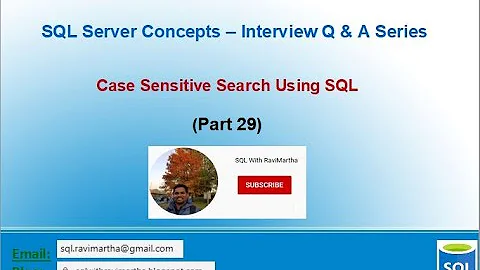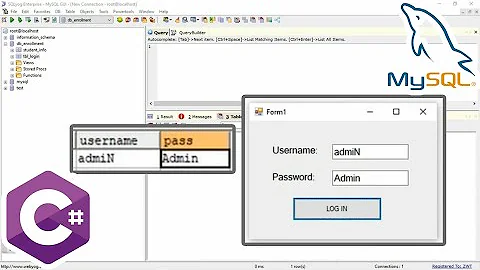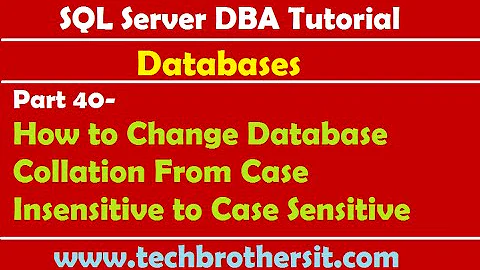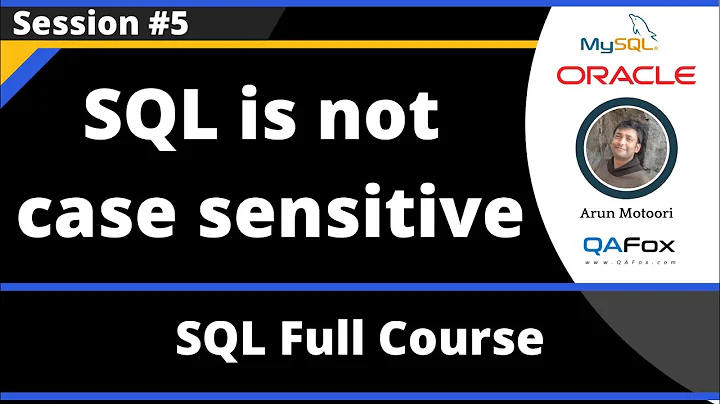Case Sensitive join TSQL
The problem is that in the second row of your results "John's Shop" shouldn't have matched "John's shop"?
You can use a case sensitive collation.
This is probably best achieved by altering the collation of the columns involved to allow index use but you can also do it at run time with an explicit COLLATE clause as below.
SELECT DISTINCT TenantID,
Name,
Name2,
TenantNumber,
Cashname
FROM Tenants
LEFT OUTER JOIN tCash
ON TenantNumber = CashNumber
AND tMoney.CashName = Tenants.Name2 COLLATE Latin1_General_100_CS_AS
The comments about joining on id instead of name are likely correct though and would negate the need to do this at all.
Related videos on Youtube
Comments
-
Geo almost 2 years
I am at a bit of a standstill here. I have a simple left outer join to a table that is returning an ID.
My code is as
Select distinct TenantID ,Name ,Name2 ,TenantNumber ,Cashname From Tenants LEFT OUTER JOIN tCash on TenantNumber = CashNumber and tMoney.CashName = Tenants.Name2My result set is as follows:
**TenantID | Name | Name2 | TenantNo | CashName** 100 |MyShop | John's shop | 12345 |John's shop 999 |MyShop | John's Shop | 12345 |John's shopMy Issue: for all intents and purposes, "John's shop" IS different from "John's Shop" - I am correctly joining my money table on the TenantNo and then on Name2, but name 2 is different by Case.
Question: Is there any way to differentiate a join based on case sensitivity? I would not want to use
UPPERorLOWERdue to the fact that it would ruin the case on reporting.Thanks!
Adding Table information below, please assume all columns are trimmed of whitespace.
tMoney
CashNumnbr | CashName 102504 Bill's Place 102374 Tom's Shop 12345 John's Shop 12345 John's shopTenants
TenantID | Name | Name2 |TenantNumber 1 |MyShop | John's Shop | 12345 2 |MyShop | John's shop | 12345 3 |Shoppee | Bill's Place | 102504 4 | Shop2 | Toms Shop | 102374Since I want to join to get the correct TenantID for an AR report, I would want to make sure I am always bringing in the correct tenant. If the case is different, is there anything I can write to differentiate a situation like John's Shop?
-
dfundako almost 8 yearsTry trimming leading and trailing white space or confirming the length/datalength of both values
-
Geo almost 8 yearsI am trimming both Name2 and the TenantNumber. It will still produce 2 rows as shown above.
-
dfundako almost 8 yearsplease provide data from both tCash and Tenants
-
Kritner almost 8 yearsyucky. If you can help it, you should probably change your tCash column to use the tenantId, rather than the name of the shop
-
Geo almost 8 years@Kritner the issue is i'm trying to return a distinct tenantID. In the world of tenants and leases, unfortunately situations like this can happen. It is crucial to get the right, case-sensitive tenant. Otherwise, I would if I could :/
-
 Martin Smith almost 8 years@Geo - But instead of storing the tenant's name as a string in
Martin Smith almost 8 years@Geo - But instead of storing the tenant's name as a string intCashyou should use a surrogate key such as tenant id. How do you know that the names are unique even case sensitively? What happens if a name changes? -
Geo almost 8 yearsA tenant can have multiple variations of a Name2 and have the same TenantNumber. So for reporting, we want to bring in the right tenantID. For instance, lease 100, 101, 102 have tenants John's Shop, John's shop and J's Shop. We can assume they are all the same owner/tenant so they have = TenantNumber. This could happen in terms of an alias or DBA in the business world. I don't like this rational but it is what it is. Thus, I know that unique names have = Tenant#s but different TenantIDs...and different leases, etc. etc. @MartinSmith
-
-
CathalMF almost 8 yearsThats interesting. I was totally unaware that string comparisons were case insensitive.
-
 Martin Smith almost 8 years@CathalMF - It depends on the collation but if you just accept the defaults when installing it and never set database or column collations explicitly you end up with a case insensitive collation.
Martin Smith almost 8 years@CathalMF - It depends on the collation but if you just accept the defaults when installing it and never set database or column collations explicitly you end up with a case insensitive collation.





